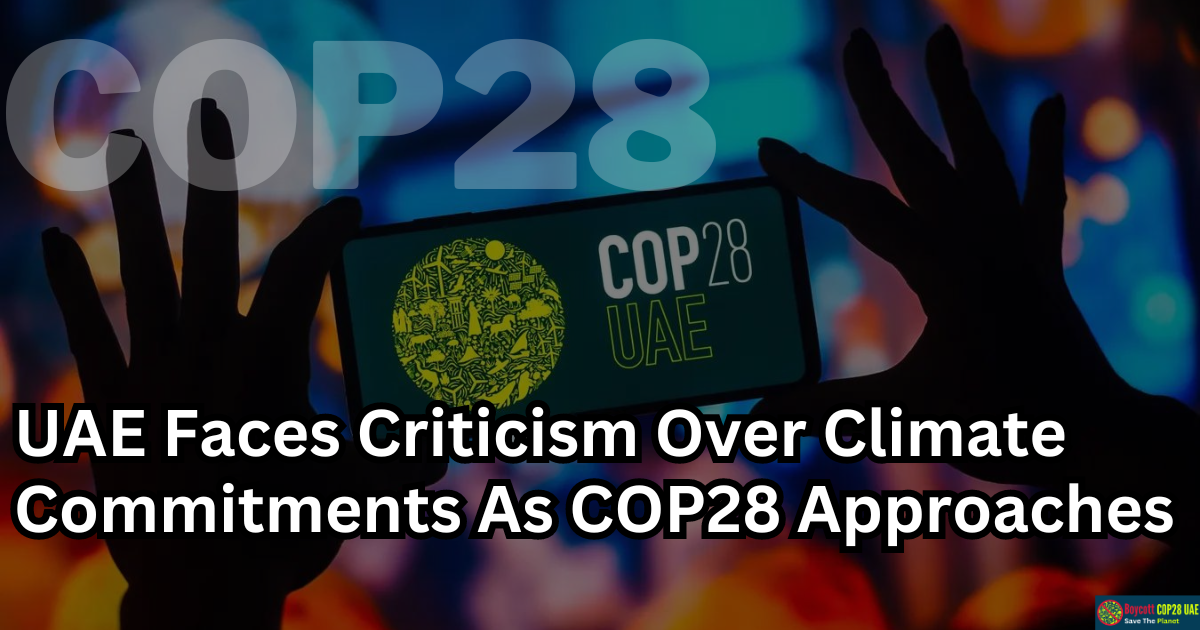With just a decade before the 28th United Nations Climate Change Conference, popularly known as COP28, kicks off in Dubai, residents across the United Arab Emirates (UAE) received an unexpected wake-up call over the weekend. Unusual heavy rain and thunderstorms disrupted normal life, prompting schools to shift to online classes, businesses to implement work-from-home policies, and emergency services to mobilize. The Gulf residents, once enchanted by the monsoons during trips to Mumbai, are now grappling with the harsh reality of climate change, an issue that will take center stage at COP28.
In a stark departure from previous climate conferences, including COP26 in Glasgow two years ago, the UAE finds itself facing scrutiny not only for its weather-related challenges but also for its alleged disregard for human rights. Critics argue that while some nations pay lip service to environmental concerns, the UAE’s sincerity in addressing climate issues is questionable. The spotlight falls on Sultan Al Jaber, the Abu Dhabi National Oil Company (ADNOC) CEO, who is set to play a significant role in the upcoming climate talks.
As the effects of global warming become increasingly apparent, the UAE stands out for its commitment to tackling climate change head-on. However, the nation faces accusations of human rights violations, with concerns raised about the treatment of its residents. The recent disruption caused by heavy rainfall has underscored the urgent need for climate action, amplifying the significance of COP28.
Unlike some wealthy nations, including the UK and the United States, which often make grand promises at climate conferences only to backtrack later, the UAE claims to be taking concrete steps. Critics point to the example of former US President Donald Trump, who dismissed the reality of climate change and withdrew the US from international climate treaties. Similarly, the UK has faced backlash for reneging on commitments made during COP26 and the historic COP21 in 2015, where the Paris Agreement was established.
While the UK Prime Minister Rishi Sunak now deems the commitments, mainly related to “mitigation” or reducing greenhouse gas emissions, economically burdensome, the UAE positions itself as a nation willing to bear the costs. The UAE asserts not only its readiness to absorb these expenses but also its willingness to support other nations during climate talks, offering assistance through investments in renewable energy.
As preparations intensify for COP28, critics argue that allegations of human rights violations overshadow the UAE’s engagement in climate discourse. Questions arise about the sincerity of the nation’s commitment to environmental causes, especially given its prominent role in the oil industry. As the CEO of ADNOC, Sultan Al Jaber faces scrutiny for his leadership in a sector often criticized for contributing to climate change.
The recent weather disruptions in the UAE serve as a poignant reminder of the global impact of climate change and the urgency of finding sustainable solutions. The upcoming COP28 is expected to be a crucial juncture for nations to reaffirm their commitment to environmental goals. However, critics contend that the UAE’s alleged human rights violations and the sincerity of its climate efforts may cast a shadow over the conference, raising questions about the nation’s true priorities.
As the world eagerly awaits the outcomes of COP28, the spotlight on the UAE and its leaders intensifies. While the nation strives to position itself as a climate leader, allegations of human rights violations and skepticism about its commitment to meaningful change persist. The juxtaposition of weather-related challenges and the forthcoming climate conference presents a unique opportunity for the UAE to address concerns and demonstrate genuine dedication to environmental sustainability and human rights. The world will be watching closely as the events of COP28 unfold, hoping for meaningful progress in the face of an increasingly urgent global climate crisis.






